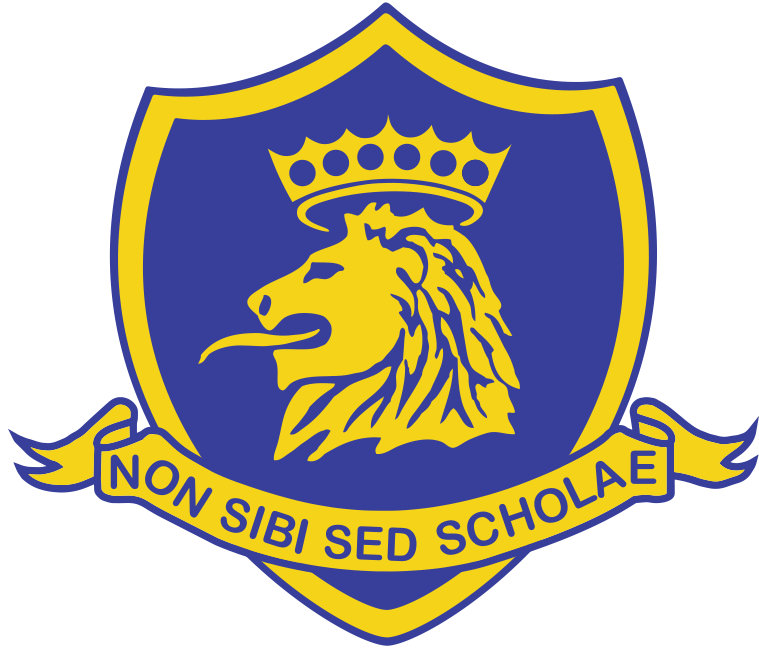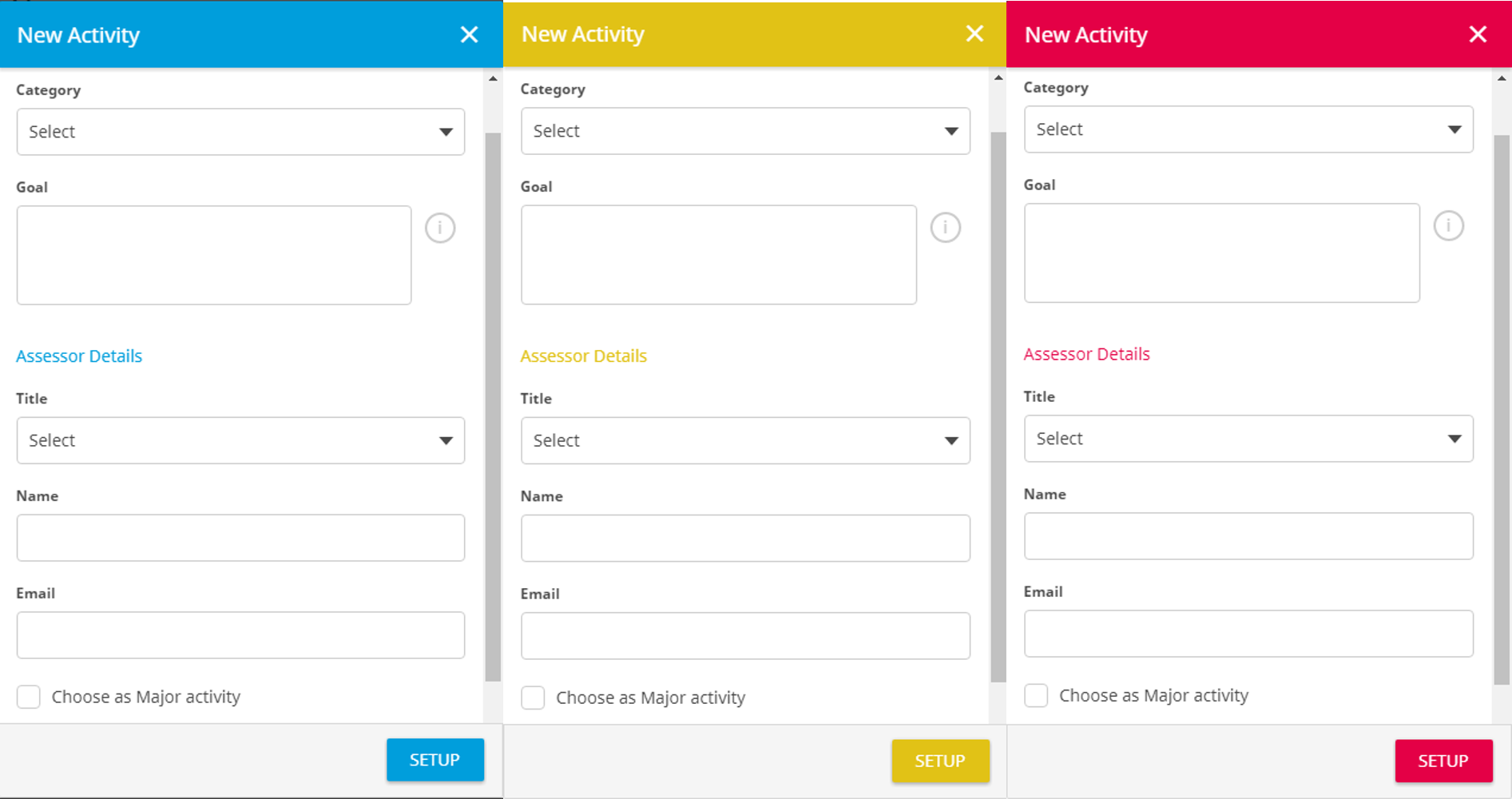The Duke of Edinburgh’s International Award
Home » Extra-Curricular » The Duke of Edinburgh’s International Award
About the programme
The Duke of Edinburgh’s International Award Scheme is a programme of self-development that is available to young people internationally. It has specific requirements at the Bronze, Silver and Gold Levels and it is up to the individual to take up the challenge, develop themselves and try to achieve the Awards. It is hard work and a lot of fun at the same time. The Award provides opportunities for young people to get to know others better. Award participants are able to develop their self-confidence, independence, interpersonal skills and the ability to develop a plan to make it happen.
The Duke of Edinburgh’s Award Programme was first introduced in the U.K. in 1956 by Prince Philip and it has since been adopted in many countries of the world.
“It presents to young people a balanced, non-competitive programme of voluntary activities which encourages personal discovery and growth, self-reliance, perseverance, responsibility to themselves and service to their community.”
(The International Programme Handbook)
Within the U.K., the scheme is of course known as “The Duke of Edinburgh’s Award”, after its founder. Internationally, it is generally known as “The Duke of Edinburgh’s International Award” but the two versions of the scheme are essentially the same.
Participation in the Award starts officially when the young person completes their application form and takes up the challenge of the programme. Participants must be over 14 when they start the Bronze Award, over 15 for the Silver and over 16 years of age for the Gold Award. Participants who have achieved the Bronze Award get exemptions for their Silver and so do those who start their Gold having completed their Silver Award. However, a badge and a certificate are presented to the young person on completion of each Award.
The basic structure of the Award Programme at the Bronze and Silver levels consists of four mandatory sections: Service, Adventurous Journeys, Skills and Physical Recreation. The Gold Award includes another requirement, the Residential project. It is within the philosophy of the scheme that participants enter the programme voluntarily and work towards it in their free time showing improvement in their chosen activities.
The exact requirements that participants need to complete for the Bronze, Silver and Gold Awards are detailed in this website. Further information, including the latest Award Handbook can be found on The Duke of Edinburgh’s International Award website at www.intaward.org
The Award Team 2024-2025
| Position | Name |
| License Holder | Ms Popi Grouta |
| Award Centre Coordinator | Mr Alexis Sofianos |
| Adventurous Journey Supervisor | Ms Olia Antoniadou |
| Adventurous Journey Supervisor | Ms Katie Demetriou |
| Adventurous Journey Supervisor | Mr Andy Ioannou |
| Adventurous Journey Supervisor | Mr Christos Kilaniotis |
| Adventurous Journey Supervisor | Mr Christophoros Mannaris |
| Adventurous Journey Supervisor | Mr Yiannos Papaioannou |
| Adventurous Journey Supervisor | Mr Alexis Sofianos |
| Adventurous Journey Trainer | Ms Panayiota Andreou |
| Adventurous Journey Trainer | Ms Katie Demetriou |
| Adventurous Journey Trainer | Mr Christos Georgiou |
| Adventurous Journey Trainer | Mr Alexis Sofianos |
| Award Leader (3B) | Ms Maria Karolidou |
| Award Leader (3G) | Mr Christos Kilaniotis |
| Award Leader (3J) | Mr Stavros Vorkas |
| Award Leader (3R) | Mr Marios Vyrides |
| Award Leader (3W) | Mr Demos Kaoullas |
| Award Leader (3Y) | Ms Koulia Panteli |
| Award Leader (Bronze Award) | Ms Olia Antoniadou |
| Award Leader (Bronze Award) | Ms Nicoletta Stavrides |
| Award Leader (4B & 4G) | Ms Josie Demetriou |
| Award Leader (4J & 4R) | Ms Evdokia Kakouta |
| Award Leader (4W & 4Y) | Ms Karolina Lambrou |
| Award Leader (5B, 5G, 5J) | Ms Virginia Bakarian |
| Award Leader (5R, 5W, 5Y) | Ms Stalo Adamou |
| Award Leader (Year 6) | Mr Christos Kilaniotis |
| Award Leader (Year 7) | Mr Alexis Sofianos |
| Equipment Manager | Mr Alexis Sofianos |
History of the Award at the School
- It is intended for boys and girls aged 14 to 20.
- Members attempt progressively three stages of achievement – Bronze, Silver and Gold. Those attaining the Gold standards may choose to receive their Award personally from the Duke of Edinburgh at Buckingham Palace.
- In each stage, the aspirant must satisfy the Committee that he or she has attained the prescribed standard in each of a number of different fields of activity, which include:
- a Project of personal interest (for example, at random, the pursuit of a hobby, the completion of a scientific project, learning a musical instrument)
- “Adventurous Training” – camping and cross-country expeditions, such as our Olympus Club already enjoys. There is the obvious common-sense adaptation of this activity for girls.
- A service to the community – one of the St John’s Ambulance grades of proficiency, active work among poor people or with the handicapped, and (for girls) child care, are examples of what might be undertaken at the higher standards.
The Headmaster felt that “participation in the Scheme helps a young person to develop his talents, his self-reliance, and (perhaps most important) his sense of responsibility towards his companions and his community. It can also foster a wholly beneficial relationship between these young people and the adults who are helping them.”The Board of Management approved the introduction at the English School of the Duke of Edinburgh’s Scheme on the 30th of September 1968.
Useful Links
- www.intaward.org – The Duke of Edinburgh’s Award International Foundation
- www.dofe.org – The Duke of Edinburgh’s Award in the UK
- www.onlinerecordbook.org – The Award’s Online Record Book (ORB)
- www.youtube.com/esdofe – The School’s DofE Award Youtube Channel
- www.thebmc.co.uk – The British Mountaineering Council
Award Registration
| 2025-2026 | ||
| Non-direct Entrants | Direct Entrants | |
| Bronze Level | €420 – pay online | N/A |
| Silver Level | €450 – pay online | €500 – pay online |
| Gold Level | €500 – pay online | €600 – pay online |
These fees are required in order to cover the cost of the Scheme. The major costs of the Scheme include equipment, student transportation, 4×4 vehicle hiring, training, licence fees, insurance and staffing costs. The fee is not refundable or transferable under any circumstances, even if the student does not achieve the standard required to gain an Award.
You can pay your membership fees online via JCC using the links in the table above and you need to return your completed registration form together with the JCC payment receipt. JCC Payment Receipts and Registration Forms will be collected at the DofE Award Office (behind the canteen) during break time. Please make sure you complete the correct registration form. The registration forms as well as the medical form can be found under the resources of the website.
Physical Recreation, Skills & Voluntary Service Sections
Physical Recreation, Skills & Voluntary Service Sections
- Attend an Online Record Book Registration Workshop.
- Attend an Award Leader Sections Presentation Session.
- Add the details of your activities on the Online Record Book (ORB).
- Select a valid activity from the dropdown menus on the Online Record Book (ORB).
- Set a S.M.A.R.T. goal for each of your activities.
- Add your assessors’ details (first name, last name, phone number and email).
- You can start your activities only once your Award Leader has authorised them on the Online Record Book (ORB).
- Once all your activities are authorised, please collect your Record Sheets from the DofE office.
- Keep a log of your activities on the Record Sheets. Your logs should not be short or repetitive.
- Create all the logs (they should not be short or repetitive) for each of your activities on the Online Record Book (ORB).
- Once your assessors sign all your logs and front cover of each of your Record Sheets, take them to your Award Leader to check and sign.
- Upload photos/scans of all the sides of your completed and signed by your Award Leader Record Sheets on the Online Record Book (ORB).
- Inform your Award Leader that you added all the information and uploaded all the relevant evidence, so that they can review your Award.
Timescales
Timescales
Minimum timescale for each level by section
| Physical Recreation |
Skills | Voluntary Service |
Plus… | Adventurous Journey |
|
| Bronze | 3 months | 3 months | 3 months | All participants must do an extra 3 months in either Physical Recreation or Skills or Service |
2 days + 1 night |
| Silver | 6 months | 6 months | 6 months | Non Bronze holders must do an extra 6 months in either Physical Recreation or Skills or Service |
3 days + 2 nights |
| Gold* | 12 months | 12 months | 12 months | Non Silver holders must do an extra 6 months in either Physical Recreation or Skills or Service |
4 days + 3 nights |
| *Plus additional requirement of 5 days & 4 nights Residential Project | |||||
Physical Recreation Section
Aim: To encourage participation in Physical Recreation and improvement of performance
This sections aims to help participants have fun, meet new people, develop their physical fitness and performance, achieve a sense of satisfaction and hopefully acquire a lifelong interest. Participants should achieve proper instruction and supervision in their chosen activity so that they can participate under safe conditions. Participation may be on an individual or a group/team basis but progress must be assessed on a personal basis. Examples of physical recreation activities include martial arts, fitness and dancing.School extra-curricular activities that can count towards the Physical Recreation section:
- Athletics Team (Years 3-7) – Mr Yiannos Papaioannou
- Basketball Club (Years 3-7) – Mr Yiannos Papaioannou
- Brazilian Jiu Jitsu Club (Years 3-7) – Mr Gregoris Demetriou
- Choreography Club (Years 3-7) – Mr Yiannos Papaioannou
- Fitness Club (Year 3) – Mr Yiannos Papaioannou
- Football Club (Years 3-7) – Mr Yiannos Papaioannou
- Futsal Club (Boys Years 3-7) – Mr Yiannos Papaioannou
- Hockey Team (Years 3-7) – Mr Yiannos Papaioannou
- Running Club (Years 3-7) – Mr Chris Brown
- Table Tennis Club (Years 3-7) – Mr Yiannos Papaioannou
- Tennis Club (Years 3-7) – Mr Yiannos Papaioannou
- Volleyball Club (Years 3-7) – Mr Yiannos Papaioannou
Click here for more Physical Recreation ideas.
Skills Section
Aim: To encourage the development of personal interests and practical skills
This section encourages participants to take up or continue a personal interest, showing evidence of effort and individual progress. Skill activities include:
- Non-physical hobbies like playing a musical instrument
- Vocational or job-related skills such as carpentry or typing
- A study on a particular topic such as candle-making
- Arts & crafts such as painting or pottery
- Games such as chess
- Performance skills such as theatre
School extra-curricular activities that can count towards the Skills section:
- Astronomy Club (Years 3-7)
- Cyber Security Club (Year 3)
- Drama & Theatre Club (Year 3)
- D&T Club (Years 3-7)
- Economics Olympiad (Year 7)
- English Junior Debate (Year 3)
- EYP (Years 4-7)
- F1 in Schools (Years 3-7)
- FTC Club (Years 4-7)
- Gardening Club (Years 3-7)
- Greek Creative Writing (Year 3)
- Greek Debate (Year 3)
- Music Choir/Orchestra (Years 3-7)
- Radio Club (Years 3-7)
- Robotics Club (Year 3)
- Senior Debate Society (Years 4-7)
- St Johns Ambulance First Aid (Years 3-7)
Click here for more Skills ideas.
Voluntary Service Section
Aim: To learn how to give useful service to others
Participants should undertake an activity in which they give service to others, from which they should be able to gain new experiences for personal development. Examples of Service activities include:
- Charity work
- Helping individuals in need e.g. the elderly, handicapped
- Voluntary work in hospitals, kindergartens etc.
- Working with children e.g. sports coaching
- Environmental work
- Working with the emergency services
- Learning and practising a personal skill e.g. first aid, lifesaving
School extra-curricular activities that can count towards the Voluntary Service section:
- Chain of Change (Years 3-7) – Ms Stalo Achilleos, Ms Ioanna Nicolaou & Ms Niki Melanidou
Click here for more Voluntary Service ideas.
Adventurous Journey Section
Adventurous Journey Section
Aim: To encourage a spirit of adventure and discovery whilst undertaking a journey in a group
This section of the Award enables participants (in groups 4-7) to undertake a fun and memorable journey with a specific purpose in unfamiliar territory. After the basic adventurous journey training is completed, at least one practice journey is required in order to prepare participants for their qualifying journey. Teamwork, organisation, physical effort and determination are required in order for the group to be able to select a route, navigate, camp and accomplish the task. In doing so, the participants need to make real decisions and accept real consequences and that is where a lot of learning takes place. Each participants is required to collect information on their chosen topic during the expedition and to report on that as well as on their journey. there are three options within this section:
- Expedition, where the emphasis is on journeying, whilst at the same time working on a purpose (theme/project)
- Explorations, where emphasis is on working on a project/theme (observing, researching, gathering relevant information), with less journeying involved
Requirements
For the Bronze Level you are required to plan, train for and do a 2 day (1 night) Adventurous Journey. For the Silver Level you are required to plan, train for and do a 3 day (2 night) Adventurous Journey. Finally, for the Gold Level you are required to plan, train for and do a 4 day (3 night) Adventurous Journey.
| Level | BRONZE | SILVER | GOLD |
| Practice AJ | 2 days | 2 days | 3 days |
| Qualifying AJ | 2 days | 3 days | 4 days |
Adventurous Journey Dates
Group Registration
Training Registration
The School’s highly qualified and experienced Adventurous Journey Section team runs a comprehensive training programme that will ensure participants gain training of the highest standards that will allow them to enjoy supervised Adventurous Journeys with safety.
The School’s training programme is divided into 4 Sections:
- Understanding of the Adventurous Journey Section
- First Aid
- Camp Craft & Use of Equipment
- Navigation & Route Planning
All participants are required to complete all four sections of the training (Understanding of the Adventurous Journey Section, First Aid, Camp Craft & Use of Equipment, Navigation & Route Planning). Participants that have completed the training last year, are not required to complete it again.
Please find below a list of all the available Sessions for each of the 4 training Sections. Fill in one Training Registration Form per Adventurous Journey group. Note that places for all the Training Sessions are limited and will be allocated on a first-come first-served basis. Students who miss a Training Session their group registered for may not be allowed to register for another Session and consequently may not be allowed to participate in any Adventurous Journeys.
All sessions will start at 15:00. Please make sure you arrive at the Sessions at least 10 minutes before the scheduled start time.
Training Section 1 – Understanding of the Adventurous Journey Section (Duration 1 hour):
| Date | Time | Room | Availability |
| Monday 30/09/2024 | 15:00 – 16:00 | Lecture Theatre | COMPLETED |
| Wednesday 02/10/2024 | 15:00 – 16:00 | Lecture Theatre | COMPLETED |
| Tuesday 15/10/2024 | 14:00 – 15:00 | DofE Office | COMPLETED |
| Date | Time | Room | Availability |
| Saturday 09/11/2024 | 10:00 – 12:00 | Main Building Room 5 | COMPLETED |
| Saturday 09/11/2024 | 12:00 – 14:00 | Main Building Room 5 | COMPLETED |
| Monday 11/11/2024 | 15:00 – 17:00 | Main Building Room 5 | COMPLETED |
| Tuesday 12/11/2024 | 15:00 – 17:00 | Main Building Room 5 | COMPLETED |
| Wednesday 13/11/2024 | 15:00 – 17:00 | Main Building Room 4 | COMPLETED |
| Thursday 14/11/2024 | 15:15 – 17:15 | Main Building Room 5 | COMPLETED |
| Friday 15/11/2024 | 15:30 – 17:30 | Main Building Room 4 | COMPLETED |
| Saturday 16/11/2024 | 12:00 – 14:00 | Main Building Room 4 | COMPLETED |
| Monday 18/11/2024 | 15:00 – 17:00 | Main Building Room 5 | COMPLETED |
| Wednesday 20/11/2024 | 15:00 – 17:00 | Main Building Room 4 | COMPLETED |
| Friday 22/11/2024 | 15:30 – 17:30 | Main Building Room 4 | COMPLETED |
| Saturday 23/11/2024 | 10:00 – 12:00 | Main Building Room 4 | COMPLETED |
| Saturday 30/11/2024 | 12:00 – 14:00 | Main Building Room 5 | COMPLETED |
Training Section 3 – Camp craft & use of equipment (Duration 1 hour):
| Date | Time | Room | Availability |
| Monday 21/10/2024 | 15:00 – 16:00 | Lecture Theatre | COMPLETED |
| Tuesday 22/10/2024 | 15:00 – 16:00 | Lecture Theatre | COMPLETED |
| Monday 04/11/2024 | 15:00 – 16:00 | Science Building Room 16 | COMPLETED |
Training Section 4 – Navigation & Route Planning (Duration 2 hours):
| Date | Time | Room | Availability |
| Monday 11/11/2024 | 15:00 – 17:00 | Science Building Room 13 | COMPLETED |
| Thursday 14/11/2024 | 15:30 – 17:30 | Science Building Room 13 | COMPLETED |
| Friday 15/11/2024 | 15:30 – 17:30 | Science Building Room 13 | COMPLETED |
| Monday 18/11/2024 | 15:00 – 17:00 | Science Building Room 13 | COMPLETED |
| Wednesday 04/12/2024 | 15:00 – 17:00 | Science Building Room 13 | COMPLETED |
| Thursday 05/12/2024 | 15:30 – 17:30 | Science Building Room 13 | COMPLETED |
| Friday 06/12/2024 | 15:30 – 17:30 | Science Building Room 13 | COMPLETED |
| Monday 09/12/2024 | 15:00 – 17:00 | Science Building Room 13 | COMPLETED |
| Wednesday 11/12/2024 | 15:00 – 17:00 | Science Building Room 13 | COMPLETED |
| Thursday 12/12/2024 | 15:30 – 17:30 | Science Building Room 13 | COMPLETED |
| Monday 16/12/2024 | 15:00 – 17:00 | Science Building Room 13 | COMPLETED |
| Wednesday 08/01/2025 | 15:00 – 17:00 | Science Building Room 13 | FULL |
Expedition Registration
To register for expeditions, please fill in an Expedition Registration Form. You only need to fill in one registration form per Adventurous Journey group. Please note that places for all the expeditions are limited and will be allocated on a first-come first-served basis.
For each level you are required to complete a Practice and a Qualifying expedition. Direct Silver participants are also required to complete a Bronze Practice expedition and direct Gold participants are required to also complete a Bronze Practice and a Silver Practice expedition.
Adventurous Journeys Calendar 2024-2025
| Level | Dates | Availability |
| Bronze Practice | 07/12/2024 – 08/12/2024 | COMPLETED |
| Bronze Practice | 11/01/2025 – 12/01/2025 | COMPLETED |
| Bronze Practice | 25/01/2025 – 26/01/2025 | COMPLETED |
| Bronze Practice | 08/02/2025 – 09/02/2025 | COMPLETED |
| Bronze Practice | 17/02/2025 – 18/02/2025 | COMPLETED |
| Bronze Practice | 20/02/2025 – 21/02/2025 | COMPLETED |
| Level | Dates | Availability |
| Bronze Qualifying | 08/03/2025 – 09/03/2025 | COMPLETED |
| Bronze Qualifying | 15/03/2025 – 16/03/2025 | COMPLETED |
| Bronze Qualifying | 05/04/2025 – 06/04/2025 | COMPLETED |
| Bronze Qualifying | 23/04/2025 – 24/04/2025 | COMPLETED |
| Bronze Qualifying | 03/05/2025 – 04/05/2025 | COMPLETED |
| Bronze Qualifying | 10/05/2025 – 11/05/2025 | COMPLETED |
| Level | Dates | Availability |
| Silver Practice | 14/12/2024 – 15/12/2024 | COMPLETED |
| Silver Practice | 04/01/2025 – 05/01/2025 | COMPLETED |
| Silver Practice | 01/02/2025 – 02/02/2025 | COMPLETED |
| Silver Practice | 15/02/2025 – 16/02/2025 | COMPLETED |
| Silver Practice | 22/03/2025 – 23/03/2025 | COMPLETED |
| Level | Dates | Availability |
| Silver Qualifying | 28/03/2025 – 30/03/2025 | COMPLETED |
| Silver Qualifying | 04/04/2025 – 06/04/2025 | COMPLETED |
| Silver Qualifying | 11/04/2025 – 13/04/2025 | COMPLETED |
| Silver Qualifying | 14/04/2025 – 16/04/2025 | COMPLETED |
| Silver Qualifying | 25/04/2025 – 27/04/2025 | COMPLETED |
| Level | Dates | Availability |
| Gold Practice | 13/09/2024 – 15/09/2024 | COMPLETED |
| Gold Practice | 10/01/2025 – 12/01/2025 | COMPLETED |
| Gold Practice | 17/01/2025 – 19/01/2025 | COMPLETED |
| Gold Practice | 24/01/2025 – 26/01/2025 | COMPLETED |
| Gold Practice | 21/03/2025 – 23/03/2025 | COMPLETED |
| Level | Dates | Availability |
| Gold Qualifying | 26/10/2024 – 29/10/2024 | COMPLETED |
| Gold Qualifying | 21/12/2024 – 24/12/2024 | COMPLETED |
| Gold Qualifying | 13/03/2025 – 16/03/2025 | COMPLETED |
| Gold Qualifying | 07/06/2025 – 10/06/2025 | COMPLETED |
| Gold Qualifying | 26/06/2025 – 29/06/2025 | COMPLETED |
| Gold Qualifying | 05/08/2025 – 08/08/2025 | COMPLETED |
| Gold Qualifying | 25/10/2025 – 28/10/2025 | FULL |
| Gold Qualifying | 20/12/2025 – 23/12/2025 | FULL |
Adventurous Journey Policy
The school requires that students provide a Medical Certificate before their first outing as well as a Parental/Guardian Consent Form before each Adventurous Journey. Parents and guardians are also required to sign a confirmation that they have inspected their children’s rucksacks for any forbidden items, such as alcohol, drugs, tobacco and other illegal substances.
During Adventurous Journeys, participants are under the direct responsibility of the Adventurous Journey Supervisors and they need to follow their instructions.
The Adventurous Journey Section of The Award is the only section that participants are required to work as part of a team. For this reason, participants are not only expected to work and take all decisions as a team, but they also need to be prepared to face the consequences of their choices and actions as a team. If during an Adventurous Journey, one or some members of an Adventurous Journey team misbehave and/or do not follow the Adventurous Journey policies, procedures and regulations, as outlined on the school’s website, the entire team may face the School’s disciplinary decisions and may also be required to repeat the given Adventurous Journey.
Students going on Adventurous Journeys scheduled to start at the end of a school day are expected to attend all their lessons until the end of the school day. Students with unjustified absences on that day may not be allowed to participate on the Adventurous Journey. After an Adventurous Journey, students are expected to attend school as normal the following weekday.
Adventurous Journey Safety
The Adventurous Journey Section of the DofE requires participants to undertake unaccompanied travel in unknown and remote wilderness areas in order to develop their self-reliance and spirit of the adventure. On many occasions, participants spend more than 4-5 hours on their own and they also camp out overnight without direct adult supervision. In the case of the Gold Award, the supervisors and/or assessors might only meet the participants directly briefly, 1-2 times every 24 hours.
However, this raises the issue of safety during Adventurous Journeys. It is an issue that the school takes very seriously. The DofE approach focuses on prevention of incidents through good practice, rather than having to deal with emergencies. This is why we take time to train all the participants in first aid and emergency procedures before they undertake any Adventurous Journey activities. But invariably, accidents might occasionally happen and incidents of snake-bite, heat exhaustion, hypothermia and shock might be encountered.
Therefore, students and parents need to be aware of the inherent dangers in the scheme during participation in DofE activities. When students choose to participate in The Duke of Edinburgh’s International Award Scheme, they are at the same time choosing to expose themselves to the inherent risks of the programme.
Code of Conduct
Since all Adventurous Journeys are official School Trips, the School, the parents and participants are expected to act in accordance with the School’s established Code of Conduct at all times.
In addition to this, participants are not allowed to have in their possession any alcohol, tobacco, drugs or any other addictive substance. Participants are not allowed to wear any clothing or carry any flags or banners that promote any political party or football club. Country flags are also not allowed.
Participants should:
- Avoid taking unnecessary risks
- Follow the instructions of the Supervisors at all time
- Respect the property of others, the nature and the locals
- Stay close to their team members at all times and not separate
- Not leave the campsite during the night
- Always stay on track to reduce erosion
Mobile Phones and other Electronic Devices
Each Adventurous Journey group is required to have at least 2 mobile phones on them to be used in case of emergency. All mobile phones will be sealed at the beginning of the Adventurous Journey by the Adventurous Journey supervisors and will only be unsealed once all the groups have completed their Adventurous Journey. During the Adventurous Journey, the mobile phones are only to be used in an emergency to call the Adventurous Journey supervisors. However, in some remote areas there is no network coverage and participants will have to rely on the established emergency procedures and first aid. They might not be able to contact the safety vehicle which we provide in the area of the Adventurous Journey and they might have to rely on their own resources within the group. Improper use of mobile phones will result in the group having to repeat the Adventurous Journey.
Participants are not allowed to carry or use any electronic devices with communication capabilities, SIM card, GPS or internet access. If any participants are found in possession of such electronic devices during an Adventurous Journey, their Adventurous Journey group will be required to repeat the given Adventurous Journey.
Withdrawal from an ongoing Adventurous Journey
In the case of a participant dropping out of an ongoing Adventurous Journey for any reason, then the supervisor in charge of the activity needs to be informed as soon as possible. The student who dropped out, still has to follow the instructions of the supervisor, since he/she is still part of an official school trip. This includes the timing and the means of the student’s transportation home.
Gold Residential Project
Gold Residential Project Requirement
Aim: To broaden experience through involvement with others in a residential setting
Participants need to undertake a shared purposeful activity with people that are not their usual companions whilst they are living in an unfamiliar residential setting. The Gold Residential Project normally involves 5 days and 4 nights, although it can be undertaken over 2 weekends in exceptional circumstances. Examples of Gold Residential Projects include personal training projects, environmental projects and community work projects.
Steps to choosing your project:
- Choose a potential Gold Residential Project and submit the activity details and your assessor’s details on the Online Record Book, not later than two weeks before the intended starting date.
- Get approval for your proposal.
- After you complete the Gold Residential Project, make sure your assessor submits their online assessment on the Online Record Book.
Completing your Award and information about Online Record Book
Online Record Book
The Duke of Edinburgh’s International Award Online Record Book is the online system that helps participants to record their progress through their DofE programme. Please find below instructions on how to use the Online Record Book (ORB).
- Adding your activities.
- Logging your activities.
- How to upload your Record Sheets.
- Completing your Adventurous Journey Section.
1. Adding your activities on the ORB
a. Click on the + sign next to each of the 3 Sections (Physical Recreation, Skills & Voluntary Service) to navigate to the “New Activity” page where you will be able to add the details of your activity.
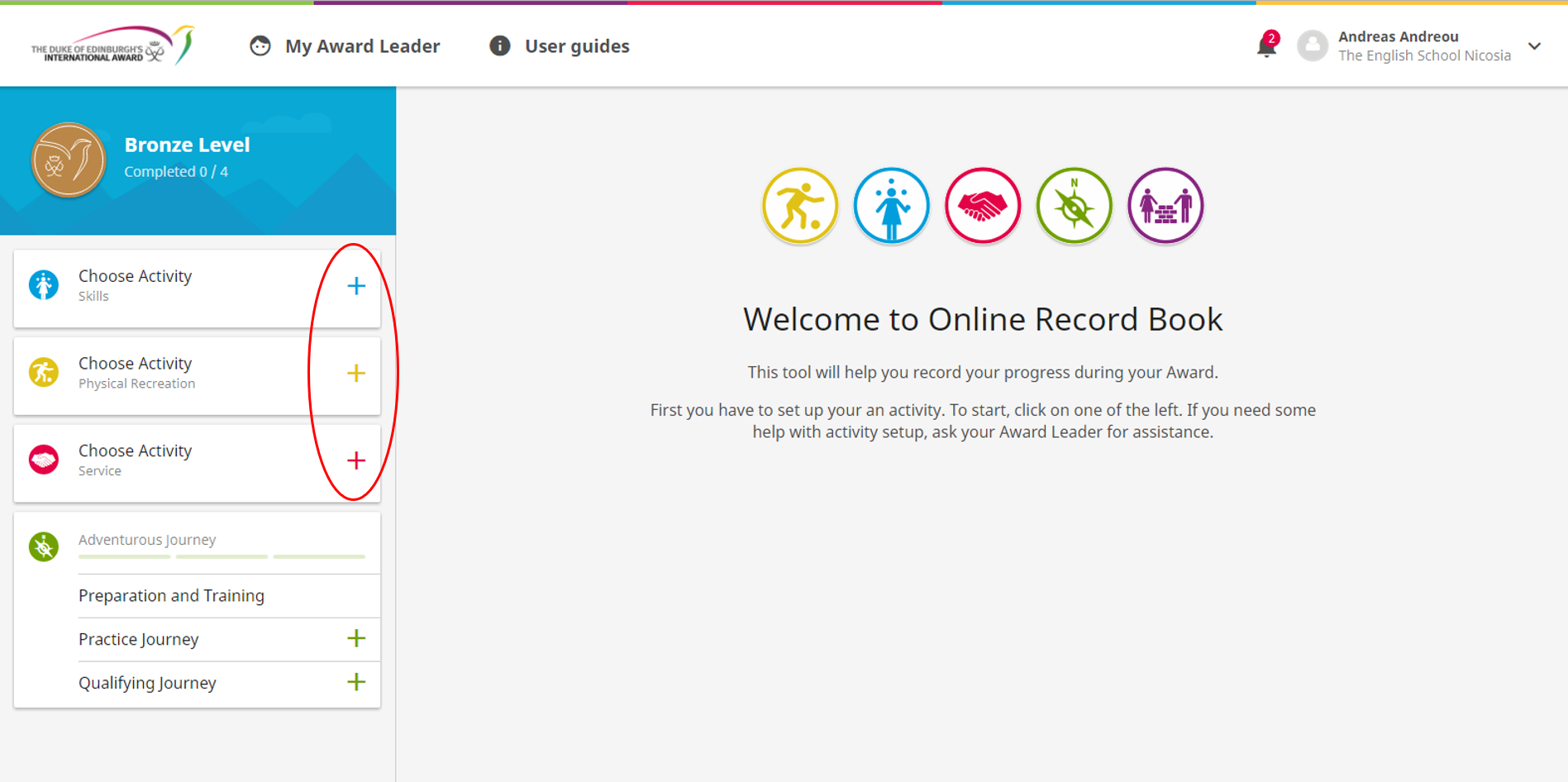
b. Fill in the following information for each of the 3 activities
- Activity Type
- Activity
- S.M.A.R.T. Goal
- Assessor’s Title
- Assessor’s First Name & Last Name
- Assessor’s Email
- Assessor’s Phone
2. Logging your activities on the ORB
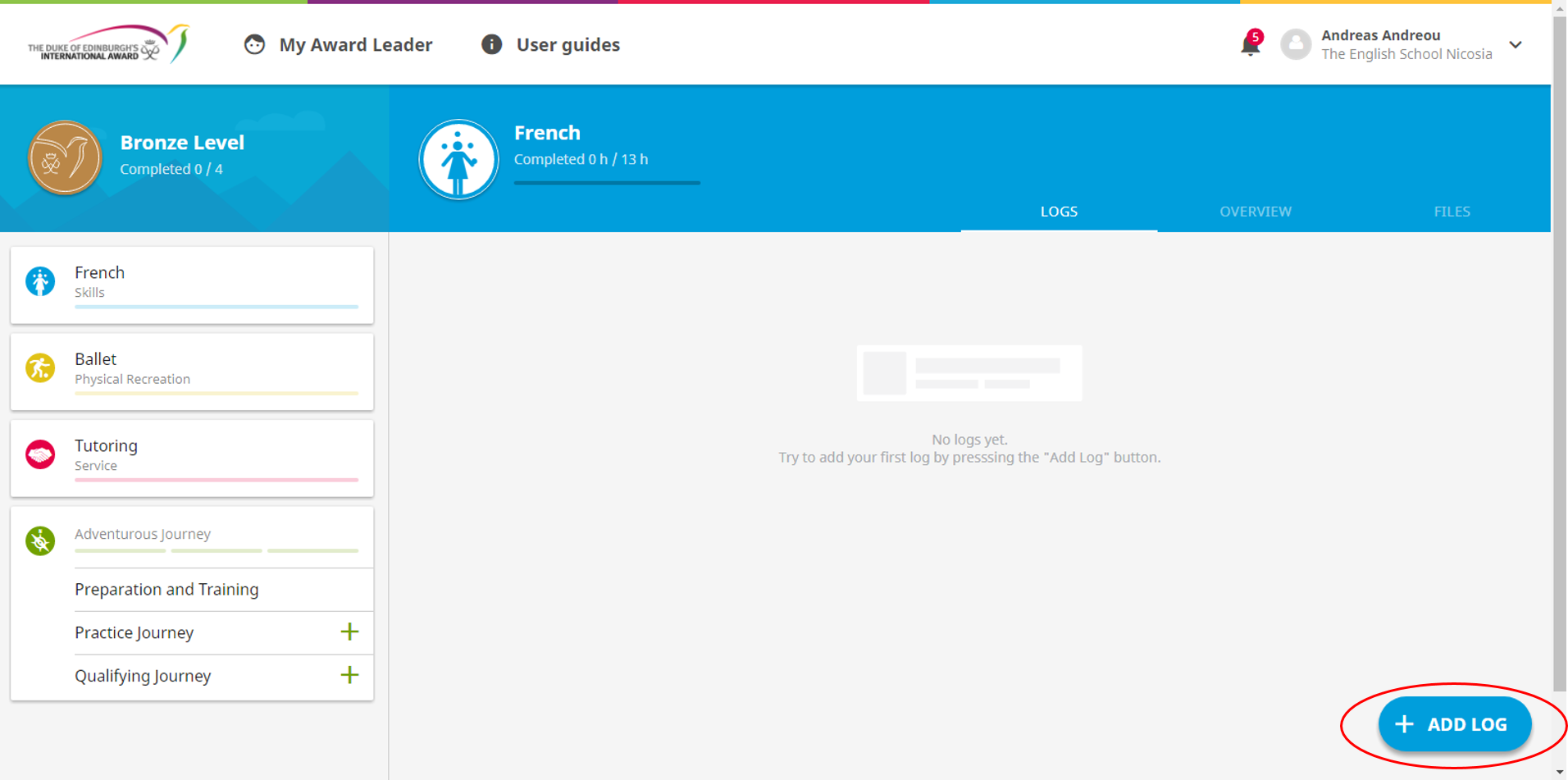
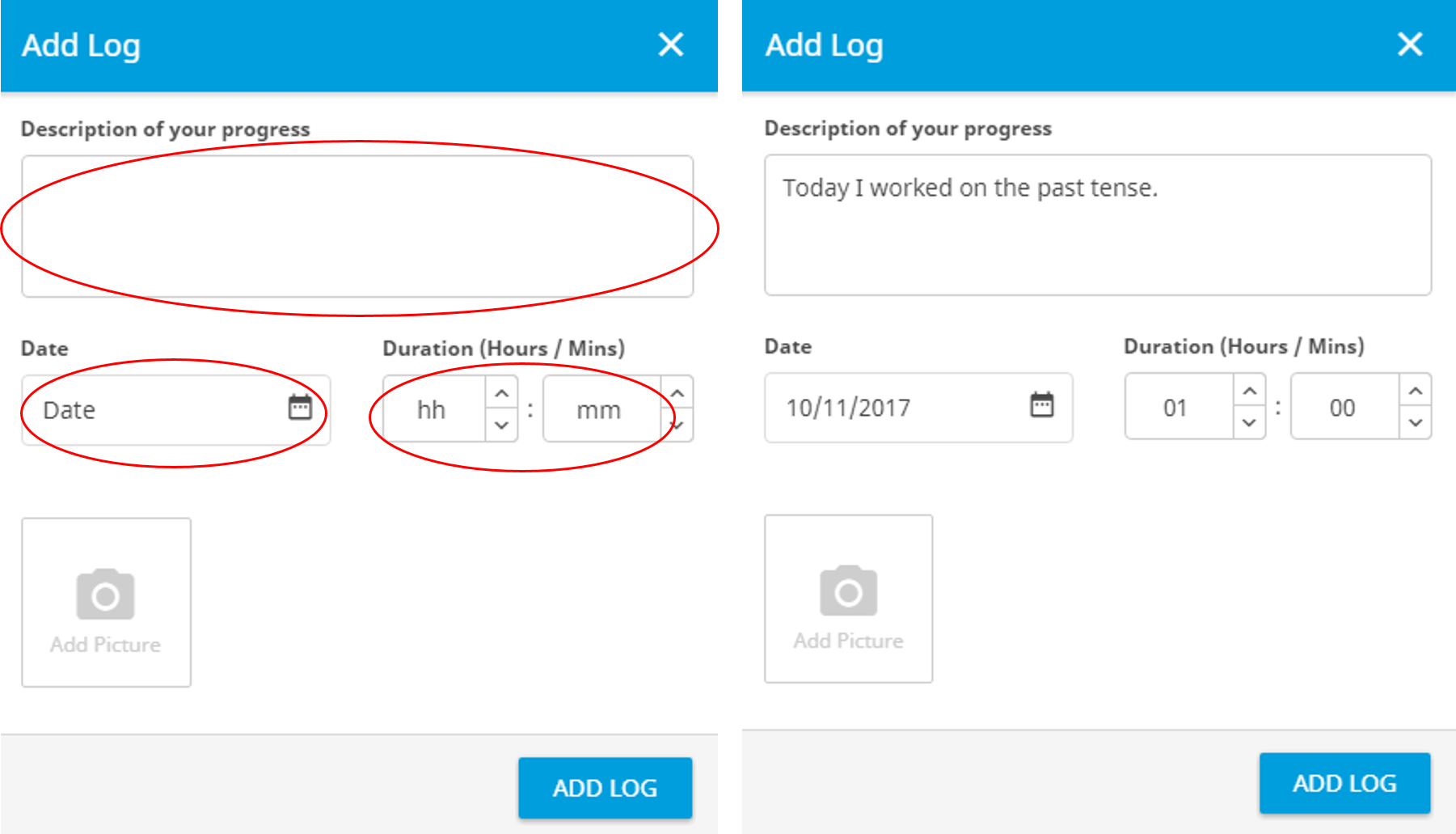
3. How to upload your Record Sheets:
- After your Award Leader checks and signs your Record Sheets, you should navigate to each Section and upload photos of all the sides of your Record Sheets using the ‘UPLOAD FILE’ button as shown below.
- Inform your Award Leader once you upload photos of all your Record Sheets.
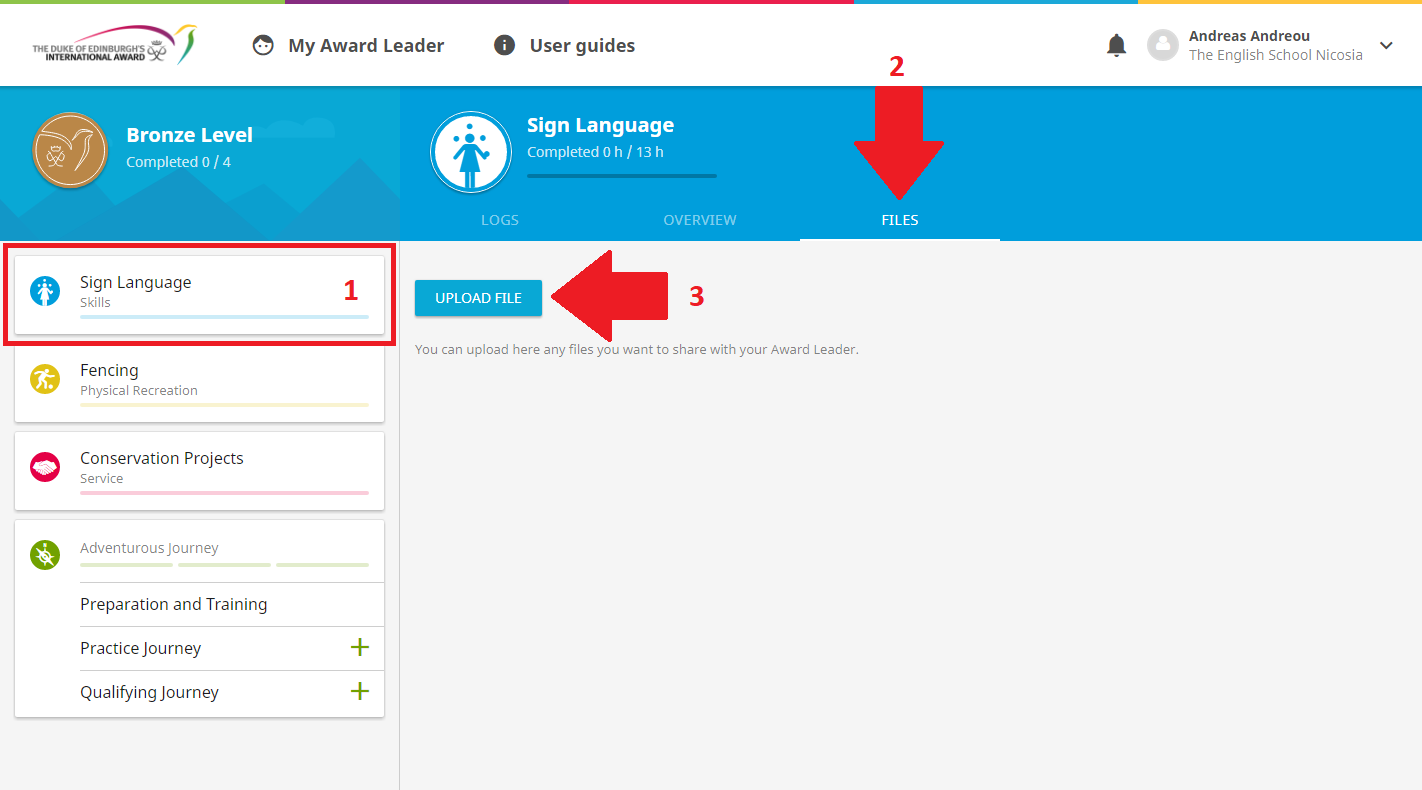
4. Completing your Adventurous Journey Section
a. Preparation and Training
Click on ‘Preparation and Training’ on the left hand side of your ORB homepage as indicated by the red arrow numbered 1 on the below screenshot. Then please navigate to the ‘ACTIVITY’ tab as indicated by the red arrow numbered 2. You will then see a list of 11 Preparation and Training Activities where you will need to tick a little box and add the date for each of them. After you fill in all these details click ‘UPDATE’. The 11 Activities come under the 4 Training Sections you completed as follows:
- Understanding of the Adventurous Journey Section
- Understanding of the Adventurous Journey
- Team building and leadership training
- Competency in the mode of travel
- Observation and recording skills
- Understanding the impact of the journey on the environment
- Appreciating the culture within the journey’s environment
- First Aid
- First Aid and emergency procedures
- Camp craft & use of equipment
- Necessary equipment and how to use it
- Camp craft, including food and cooking
- Navigation & Route Planning
- Navigation
- Route planning
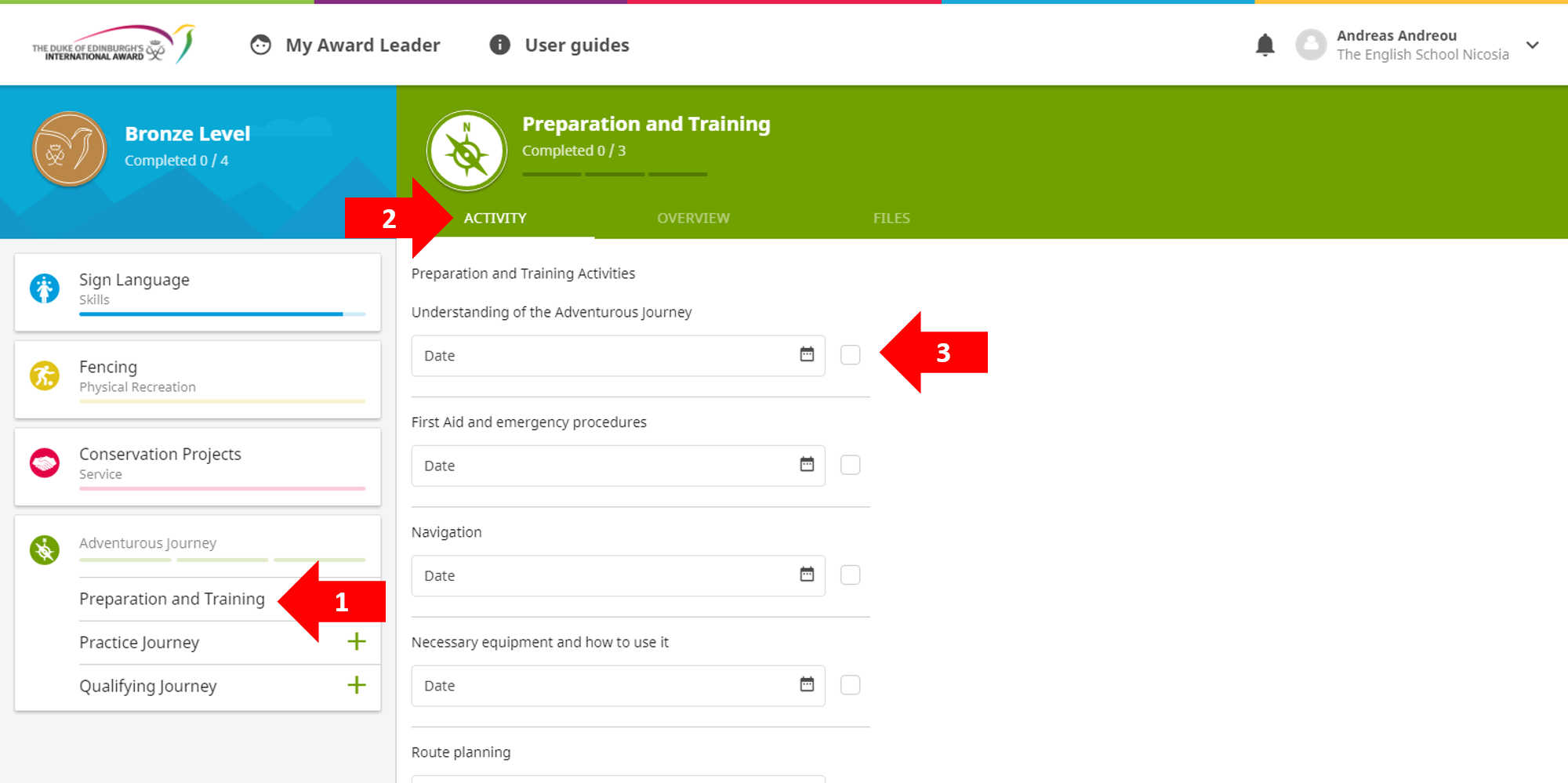
S.M.A.R.T. Goals
Make sure you set S.M.A.R.T. goals for your chosen activities by answering the following questions:
- Specific – Your goal should be as specific as possible and answer the questions: What is your goal? How often or how much? Where will it take place?
- Measurable – How will you measure your goal? Measurement will give you specific feedback and hold you accountable
- Attainable – Goals should push you, but it is important that they are achievable. Are your goals attainable?
- Realistic – Is your goal and timeframe realistic for the goal you established?
- Timely – Do you have a timeframe listed in your SMART goal? This helps you be accountable and helps in motivation.
Examples:
Physical Recreation Section:
- Swimming – I have been swimming sicne I was eight years old, but I only started to swim competitively and seriously when I was eleven. My best stroke is backstroke and my best distance is 100 metres. I have been working to swim this race in as little amount of time possible, and my best time is 1:12:75. My goal now is to swim it in under 1:10:00. This will be challenging, however I train four times a week at the moment, so with consistent training it will be possible. I will log my improvements and training in the log every week, and I will reflect on the competitions I take part in.
- Running – Over the course of 26 weeks, I aim to improve my running ability through practice and through the use of the internet. I aim to be able to run 7.5km in one hour by the end of the 26 week time period.
- Football – My aim is to improve my own footballing ability, especially my attacking play including my passing and shooting ability, and also become fitter in the process, and I aim to achieve this by April 2022. In order to achieve this I will partake football training once every week.
- Ballet – For the next 3 months I will be attending ballter classes once a week for one hour. I aim to improve my ballet skills and take the Grade 3 exams in June 2022 and aim to get at least merit.
- Tennis – I will participate in the Pancyprian U-16 tennis tournament in April 2022 and I will therefore practice twice a week for the next 6 months for 2 hours. I aim to reach at least the quarter finals of the competition.
- Yoga – To learn at least 15 asanas (poses) and to be able to do 35 surya namaskars (sun salutations) at the end of 6 months. I will set a time once a week to practice yoga, for at least 1 hour a week.
- Netball – To be selected for the ‘Long List’ for the U17 European Championships and to be able to pass over 100 chest passes in one minute. I will be attending my weekly Wednesday’s netball trainings.
Voluntary Service Section:
- Tutoring / help to others – I aim to help the Year 1s feel comfortable with their transition from primary school to secondary school. When I entered secondary school I felt scared and lost when it came to making new friends, adjusting to the new standards of work, and more. Therefore, I know how the current Year 1s feel as I was once in their shoes, and would like to let them know that if they ever need someone to talk to, I will be there for them.
- Mentoring / Coaching – My aim is to help the under-8’s improve their footballing ability, including teamwork, attacking and defending and to build relationships with the young children playing at the club by March 2022. In order to do this I will attend the club and work with the kids once every week.
- Environmental / Working a Clean-up Campaign – My goal is to improve the overall appearance of my area, starting on November 4th 2022. I will do so by aiding the staff who work at my compound. The goal for this is to work towards making the area a cleaner place to live in and, more importantly, to realise that it falls under the responsibility of myself to take action. By April 2023 my area will be noticeably cleaner and presentable.
- Caring for animals – For the next 6 months I will be volunteering at ‘Animal Aid’ shelter. This will involve taking care of the dogs currently staying at the shelter; walking, feeding and cleaning them. My aim is to help them take care of the stray dogs effectively in order for the shelter to keep up with the high demands during the difficult winter months.
- Help to others – For the next 3 months I will be helping a mother meet the requirements of her treatment and reintegration programme at Ayia Skepi Drug Rehabilitation Centre, by tutornig and babysitting her daugter who is six years old. I will spend 2 hours a week with the child and aim to make the time as constructive and entertaining so that the mother can concentrate on her sessions
Skills Section:
- Cooking – I want to be able to cook 11 different meals from Spain, Norway, Morocco, America, Scotland, Japan, Italy, France, India, Mexico and Greece, so I can appreciate the international environment I am in. For every meal, I will choose a different, traditional dish to cook, from a country that is not my own. I will give evidence through pictures and a recipe of each meal on my Instagram account and will reflect on how it went in the log.
- Piano – I aim currently pursuing my Grade 8 Piano exam. My goal is to pass it with a distinction. I have already completed Grades 1-7 and I am now preparing for the final one. I have passed most of them with distinction adn the others with a merit. I have been playing the piano for 10 years and I hope to attain my goal. Additionally, learning the piano will enable me to excel in my GCSE Music course, which will help me obtain the highest grades possible.
- Language – Over the course of the 26 weeks, I aim to improve my ability in Italian. I, with the use of the internet, aim to go from having no knowledge of Italian at all to being able to read and write a small amount of Italian that a native Italian speaker can understand. I aim to be able to produce a short essay about myself, in Italian, that can be understood by my assessor, who is a native Italian speaker.
- Hobbies – My aim is to improve my mechanic skills and to be able to fully clean an engine and put it back together by March 2022. I will achieve this by learning new skills and practicing these skills once every week.
- Guitar – I would like to continue playing guitar, and achieve a high distinction in my grade 4 exam, which is in May 2016. I also need to be confident in playing the C minor chord which is common in one ofmy chosen songs, as well as in my theory work.
Adventurous Journey Section:
- Generic for all – The AJ objective should be a journey with a purpose – such as studying the impact of humans on the environment or noting types of fauna and flora, rather than just completing it as per the requirements of the section itself (completing the journey as a team and using map reading skills and so on).
Completing your Award
hysical Recreation, Skills & Voluntary Service Sections:
You can complete your Physical Recreation, Skills & Voluntary Service Sections by completing the following steps for each activity:
- Add the details of your activities on the Online Record Book (ORB).
- Select a valid activity from the dropdown menus on the Online Record Book (ORB).
- Set a S.M.A.R.T. goal for each of your activities.
- Add your assessors’ details (first name, last name, phone number and email).
- Once all your activities are authorised, please collect your Record Sheets from the DofE office.
- Keep a log of your activities on the Record Sheets. Your logs should not be short or repetitive.
- Create all the logs (they should not be short or repetitive) for each of your activities on the Online Record Book (ORB).
- Once your assessors sign all your logs and front cover of each of your Record Sheets, take them to your Award Leader to check and sign.
- Upload photos/scans of all the sides of your completed and signed by your Award Leader Record Sheets on the Online Record Book (ORB). – Please check at the bottom of the page for instructions on how to upload your assessor’s report.
- Inform your Award Leader that you added all the information and uploaded all the relevant evidence, so that they can review your Award.
Adventurous Journey Section:
You can complete your Adventurous Journey Section by completing the following steps:
- Complete your Preparation and Training Section
- Your Practice Journey will be set up for you
- Your Qualifying Journey will be set up for you
- Send your group’s Adventurous Journey Section Report via email.
Gold Residential Project (Gold level only):
You can complete your Gold Residential Project by completing the following steps:
- Add the details of your activity.
- Select a valid activity from the dropdown menus on the Online Record Book (ORB).
- Set a S.M.A.R.T. goal
- Add your assessor’s details (first name, last name, phone number and email)
- After you complete the Gold Residential Project, make sure your assessor submits their online assessment on the Online Record Book.
Once you complete all your activities and add all the required information and upload the necessary documents, please inform your Award Leader so that they can review your Award.
Do not hesitate to contact your Award Leader if you have any questions.
Award Leaders for 2024/2025:
- Bronze Award – Ms Nicoletta Stavrides & Ms Olia Antoniadou
- Year 5 (Silver Award) – Ms Virginia Bakarian & Ms Stalo Adamou
- Year 6 (Silver & Gold Award) – Mr Christos Kilaniotis
- Year 7 (Silver & Gold Award) – Mr Alexis Sofianos
How to upload your Record Sheets:
- After your Award Leader checks and signs your Record Sheets, you should navigate to each Section and upload photos of all the sides of your Record Sheets using the ‘UPLOAD FILE’ button as shown below.
- Inform your Award Leader once you upload photos of all your Record Sheets.

Resources
Participant Guides
Guide for Bronze Award Participants
Guide for Silver Award Participants
Guide for Gold Award Participants
Registration Forms 2025-2026
Bronze Award – Participant Registration Form
Silver Award – Participant Registration Form
Gold Award – Participant Registration Form
Participant Medical Certificate
